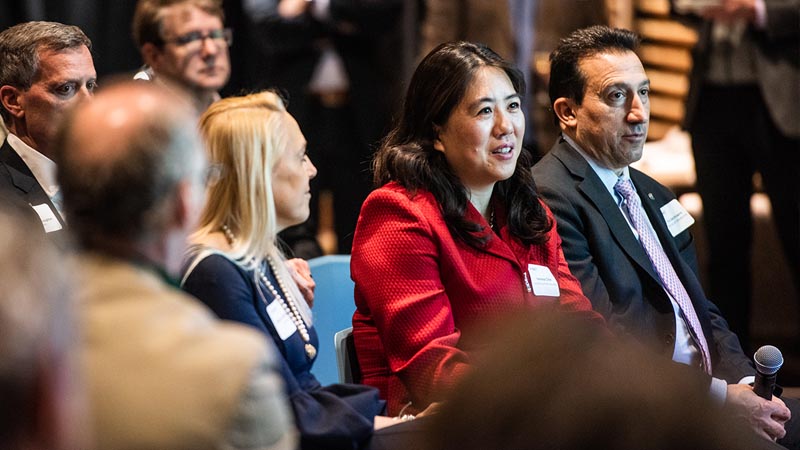
Early stage startup founders need to differentiate themselves from the crowd. Many market themselves by talking about their unique product or the industry their disrupting. But the best way to really gain attention is to have a solid origin story.
Why did they choose entrepreneurship?
What challenges did they overcome along the way?
How does their entrepreneurial journey affect their lives and personal relationships?

Crafted correctly, an origin story will be the backbone of any early-stage startup’s marketing efforts. It’ll put a human face on the brand and help connect with consumers, clients, and potential investors. But developing your origin story is tricky. Thankfully, Iris Mansour is here to help. She spent years as a journalist writing for Fortune, Mashable, The Guardian, Reuters, and Quartz —so storytelling is kind of her thing. Now she runs workshops to help startups tell better stories.
Mansour visited Comcast NBCUniversal LIFT Labs to help startup founders workshop their origin stories — explaining that companies are made up of unexciting things like sales figures, quarterly goals, and production cycles. That’s why focusing on the human side of your business is critical.
“The beginnings of any company are always the most vulnerable and creative times. You have something really juicy and human to work with. You’re overcoming hurdles, overcoming obstacles, and we can all relate to that. You’re a David in a Goliath world,” she said.
Sharing personal stories helps humanize your brand, making it relatable and engendering emotion in potential clients and investors.
“So many key venture capitalists say they are investing in your story and investing in your potential,” said Mansour. “The origin story — how you began and why you began this company — is the best indication of what truly motivates you, whether that motivation is strong enough, and whether you’ll be able to overcome the inevitable hurdles to come.”
4 Steps to Telling a Great Startup Origin Story
Like journalism, a great origin story is more about story finding than storytelling. Use these four steps to find your story — and craft a narrative that’s sure to raise eyebrows.
-
Introduce the founder.
Don’t focus on processes, focus on a person. When you think of Apple, you think of Steve Jobs. When you think of Chanel, you think of Coco Chanel. Think of your startup founder as the lead character in a movie about your company. “People do not identify with faceless institutions. We are wired to identify with other individuals — people like us who have overcome challenges in ways we’ve overcome challenges,” said Mansour.
-
Identify the problem… and what’s at stake.
You found a problem in the world and have a groundbreaking solution to solve it. Great! Now tell us whose lives will be changed by your solution. Tell us why now is the time for your solution to change the world. But don’t overdo it. “This is the least important section,” said Mansour. “Frequently, entrepreneurs want to do everything here. They want to lay on the problem because it’s directly related to their business. But remember, you’re trying to heighten emotion so you will touch upon this but focus more on making yourself feel real to other human beings.”
-
Show your resilience.
Everyone knows starting a business is hard, so explain the specific challenges you’ve faced and how you’ve overcome them. What odds were stacked against you — both personally and professionally? Are you a woman in a traditionally male-dominated industry? Did a family tragedy spark you into entrepreneurship? “Every compelling business story is about someone who took a risk and overcame challenges,” said Mansour. “They all struggled to get their ideas off the ground. That shows grit and it inspires consumers.”
-
Show initial success.
What was the first sign that this crazy idea of yours would actually work? Was it a new client, acceptance into a startup accelerator or pilot program? “We want some kind of a resolution. We want some satisfaction. We don’t have a happy ending because you’re an early-stage company, but show the first sign of success. The first moment where you saw people adopting whatever you’re doing — we need to hear about that. People started buying it and ‘wow I can actually do this.’ ”
